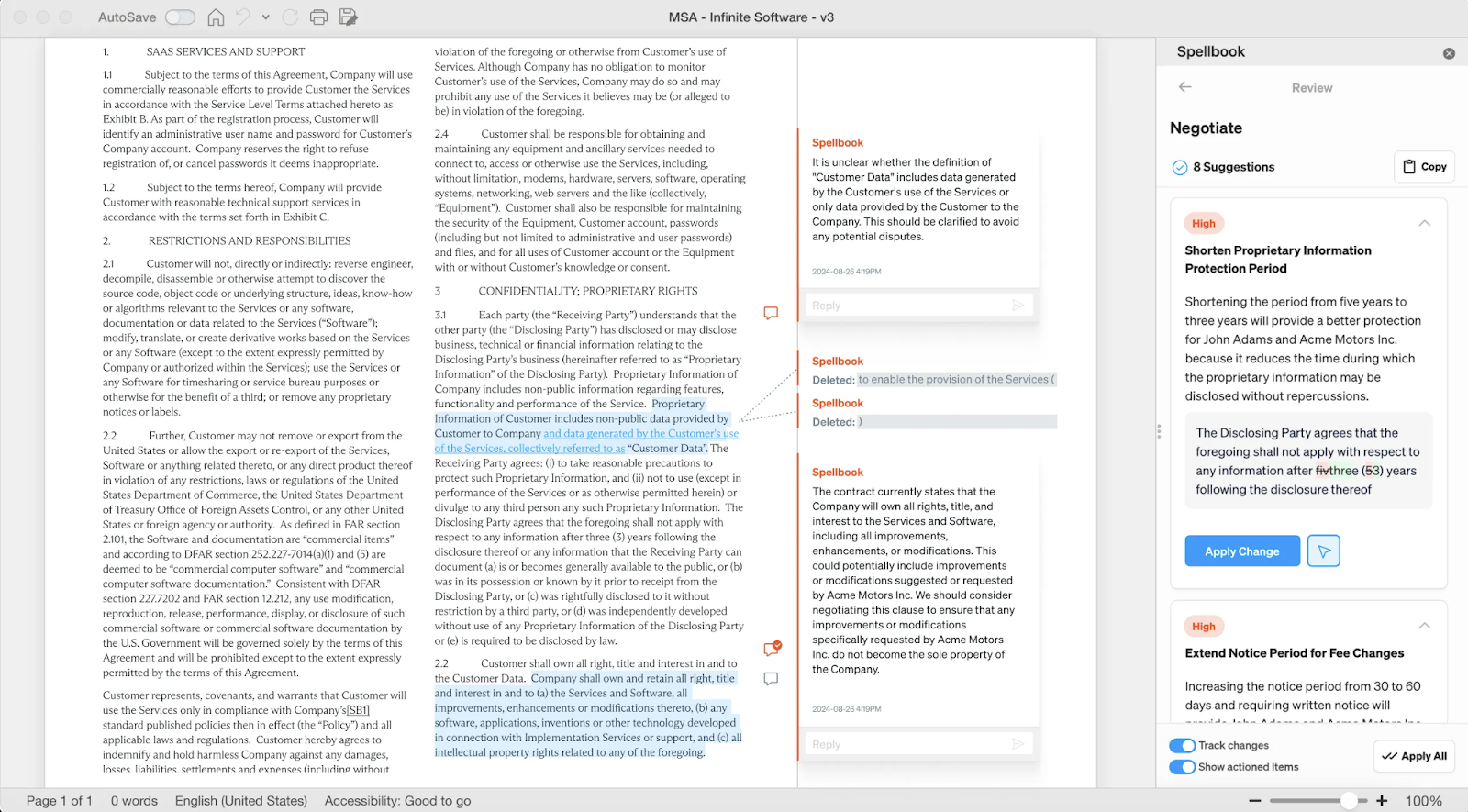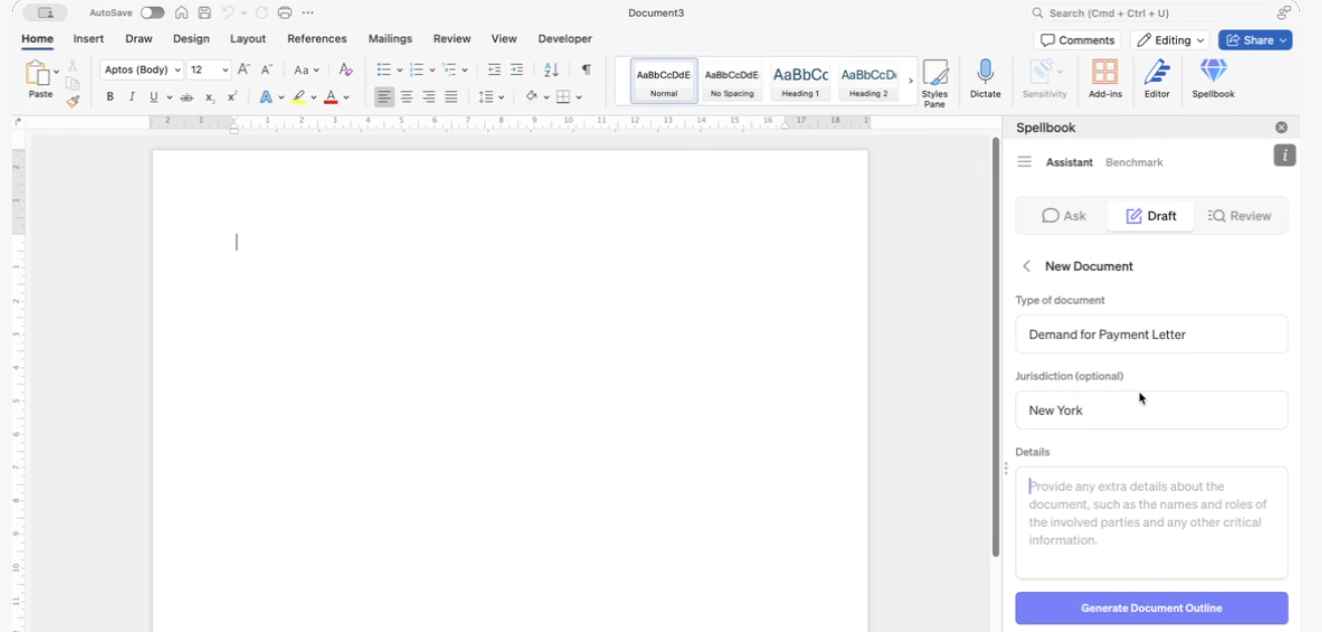
AI Due Diligence: Faster M&A and Legal Review
.png)
AI due diligence has moved from a "nice-to-have" feature to a critical industry standard. Whether you are managing a merger, an acquisition, or a complex real estate deal, the volume of data in today's virtual data rooms (VDRs) makes manual review a liability.
Here's how legal professionals like you are using AI tools to streamline their due diligence workflows.
Key Takeaways
- AI helps you save significant time and effort compared to manually conducting legal due diligence.
- You can enhance accuracy, ensure alignment with regulatory requirements, and receive automated risk assessments with AI.
- Premium legal tools such as Spellbook help you conduct legal due diligence without worrying about security, bias, or accuracy.
.png)
How Automated Due Diligence Works: Step-by-Step
Understanding the technical "how" is essential. Most implementation frameworks follow this flow:
- Data Aggregation: The AI ingests unstructured data from the VDR, using Optical Character Recognition (OCR) to read even messy, scanned PDFs.
- Analysis & Extraction: Natural Language Processing (NLP) algorithms parse the text to understand legal context and intent.
- Risk Prioritization: The system benchmarks terms against market standards and flags anomalies.
Reporting: The tool generates a disclosure schedule or risk summary, allowing you to focus on the "fix" rather than the search.
Key Applications of AI in Due Diligence
AI is revolutionizing due diligence across legal, financial, and regulatory sectors by significantly enhancing speed, consistency, and depth. It enables professionals to efficiently and accurately process vast amounts of data, making it invaluable for high-stakes transactions like mergers, acquisitions, and major investments. AI's strengths lie in its ability to recognize patterns, understand context, and detect anomalies.
Here's how legal professionals streamline due diligence workflows, using AI tools.
1. Automating Document Review
Traditionally, due diligence may require you to spend hours reviewing documents, contracts, and financial reports. AI algorithms can now automate document review tasks, making them faster, more accurate, and highly scalable.
For example, Spellbook, an AI-powered tool for lawyers, can:
- Quickly analyze contracts and flag potential risks.
- Ensures compliance with legal and industry standards, regulatory requirements, and corporate policies.
- Highlights missing protections that may lead to future problems.

The image above illustrates how Spellbook identifies potential risks and suggests solutions to address them.
When you leverage AI tools for due diligence, you reduce your manual workload while ensuring that you meet legal obligations and deadlines.
{{cta-surprise-red}}
2. Risk Identification and Analysis
A single overlooked clause can result in significant liabilities. A company can lose millions in lawsuits over a vague indemnity clause that no one caught during due diligence.
AI tools can now identify high-risk clauses, including data privacy gaps, indemnification terms, and termination clauses. For example, Deloitte implemented AI and machine learning to power its acquisition analysis platform. They could then more easily organize and analyze massive amounts of data with greater speed and accuracy.
“Before AI appeared, lawyers reviewed 50-100 documents per hour. But with the help of AI, it can reach 3000 copies per hour.”
– Losey, Ralph, et al., from Combination of Artificial Intelligence with Mergers and Acquisitions by He Wang and You Zhou. BCP Business & Management. Volume 39 (2023).
Deloitte is also developing an AI-driven mergers and acquisitions (M&A) market perception platform that can help track market trends, spot transaction insights, and identify risks and opportunities much faster.
Spellbook brings this same level of AI-powered precision directly into the contract workflows of legal professionals. Integrated into Microsoft Word, Spellbook flags high-risk contract elements, such as one-sided termination clauses or missing GDPR-related language, based on built-in playbooks, templates, and benchmarks.
This is just one way AI assistance can make legal work more straightforward and efficient for everybody.
3. Compliance Checks
Complying with every regulatory requirement, including GDPR, CCPA, and SEC rules, can be challenging, especially when reviewing documents manually.
AI tools help ensure alignment with regulatory requirements by identifying non-compliant contract clauses in seconds. In one study, researchers found that AI can review data processing agreements for GDPR compliance with accuracy rates of 86.7% and 89.7% using pre-trained language models. AI isn’t perfect, but it can accomplish most of the job and help ensure that you include the appropriate clauses in your agreements.
AI-driven compliance tools not only expedite document review but also enhance accuracy, significantly reducing the risk of human error, especially in high-stakes legal transactions. Think of it as a regulatory watchdog, continuously scanning agreements to make sure they meet legal standards.
4. Streamlining Cross-Border Due Diligence
International transactions often involve multiple jurisdictions, each with its own regulatory requirements. AI tools simplify cross-border compliance by evaluating contracts against each jurisdiction’s local laws to ensure compliance in every region.
Using comprehensive, legally specific contract tools, such as Spellbook, optimizes AI system efficiency by enabling cross-border compliance through area-specific contract reviews. Simply add each location in the ‘Jurisdiction’ section, as shown in the image below.

After you input the jurisdiction, Spellbook automatically compares your documents based on the relevant jurisdiction standards.
Spellbook can also automatically benchmark contract terms against industry standards to keep you a step ahead in all aspects of your work.
Traditional vs. AI-Powered Due Diligence: Side-by-Side Comparison
The traditional due diligence model was a labor-intensive process prone to human error. It often took weeks or months to complete, as junior associates manually combed through thousands of pages. AI introduces a new framework centered on speed and scalability.
AI Due Diligence in M&A and High-Stakes Deals
In a merger or acquisition, the primary goal is to validate the investment thesis and protect the deal value. AI allows you to perform a more rigorous target company evaluation than before:
- Financial Analysis: Scan financial statements, balance sheets, and EBITDA reports to find hidden liabilities.
- Risk & Integration: Instantly flag change-of-control clauses or restrictive covenants that could trigger "deal-breaker" costs or hinder post-deal synergies.
- Gap Analysis: While a human might overlook a missing GDPR or CCPA clause, AI scans for the "empty space" and flags the absence of mandatory language in seconds.
Traditionally, due diligence requires you to spend hours reviewing contracts and financial reports. AI algorithms now automate these tasks, making them faster and highly scalable.
Industry-Specific Applications Beyond Legal
Automated due diligence isn't just for lawyers; it is also a powerful tool for other business areas.
- Finance & Fintech: Automated AML (Anti-Money Laundering) and KYC (Know Your Customer) checks reduce onboarding time by 80%.
- Real Estate: Quickly perform lease abstraction across thousands of properties to find rent escalation inconsistencies.
- Supply Chain: Identify potential risks in logistics and transportation agreements to prevent fraud and ensure global compliance in logistics contracts.
What Are the Challenges of AI Implementation?
Transitioning to an AI-powered due diligence workflow is a strategic shift rather than a simple software installation. To secure ROI, legal teams must navigate these challenges:
- The Co-Pilot Model: AI excels at data collection & processing, but it remains a co-pilot. You must maintain a "Human-in-the-Loop" approach, where attorneys perform the final validation to ensure legal accuracy during a high-stakes deal evaluation.
- Security and Privacy: M&A and finance data require strict confidentiality. Only use private, SOC 2-certified environments with a Zero Data Retention policy. This prevents sensitive client data from leaking into public Machine Learning models.
- The Accuracy Gap: No system is 100% perfect. Your team should audit outputs for algorithmic bias or "hallucinations" (fabricated information), especially when navigating complex legal regulatory requirements.
- Legacy Data Constraints: AI can't analyze what it can't read. Poor-quality scans or handwritten notes create unstructured data that can hinder analysis. You will need high-quality Optical Character Recognition (OCR) to digitize these files effectively.
- Change Management: Adoption requires shifting your firm's culture from "manual searching" to "strategic validation." Investing in training for NLP and AI tools is the fastest way to increase team productivity.
What is the Future of AI in Due Diligence?
The industry is transitioning from reactive tools toward Agentic AI: autonomous systems capable of managing multi-step workflows. These "digital associates" will go beyond simple flagging to proactively cross-reference VDR files with internal deal databases, proposing specific indemnification language and drafting "fix" clauses directly into your Purchase Agreement.
Beyond gains in automation, due diligence will increasingly rely on Predictive Modeling to become a standard for valuation and risk assessment. These systems will analyze historical litigation data and market standards to forecast potential liabilities before they arise.
Integration with blockchain technology will further accelerate the process, providing immutable, real-time verification of assets and ownership that transforms the "minutes-to-hours" workflow into a seamless reality.
How Lawyers Can Use Spellbook for Due Diligence
There are many free online AI tools for lawyers. However, you should also conduct due diligence before choosing which AI software to use. Steps to do so include:
- Identify potential risks associated with an AI tool before implementing it.
- Evaluate the reliability of its AI algorithms.
- Assess the impact on data privacy, particularly when using free online tools.
- Audit the AI model's performance to determine if it can truly accelerate legal work.
But how can you check each aspect and ensure an AI tool is effective and safe? The solution is to use a reliable platform that’s secure and made specifically for lawyers.
Spellbook is a legal AI contract review and drafting software that accelerates due diligence. It can review and analyze legal documents with AI-powered risk assessment and compliance verification.
The Spellbook team monitors AI bias and fairness to ensure you benchmark your client in the right direction. This chart compares Spellbook to basic free AI tools (e.g., ChatGPT):
Put simply, Spellbook makes legal work faster, more reliable, and less risky compared to online AI tools that may not be secure or reliable and are not trained for legal work.
Want to see how Spellbook can conduct due diligence for you? Schedule a free demo today.
{{cta-surprise-red}}
Frequently Asked Questions
Can AI Predict Risks in Due Diligence Accurately?
Yes, AI can accurately predict risks in due diligence, provided that you use tools specifically designed for lawyers and double-check their responses. While AI is a valuable aid in predicting risks and improving efficiency, human oversight remains essential for ensuring that the predictions are accurate and contextually appropriate.
What Limitations Should I Consider When Using AI for Due Diligence?
While AI for due diligence is very helpful, it may not be 100% correct at all times. There may be instances where AI tools may misinterpret complex legal language due to a lack of contextual understanding. Complement AI with human expertise to achieve optimal results.
Are AI-Driven Due Diligence Insights Trustworthy?
Yes, legal AI tools can provide highly reliable insights when trained on accurate legal data and benchmarked against legal standards. Spellbook cross-references contracts and their attachments, identifies potential risks and opportunities, and ensures jurisdictional compliance to give you trustworthy insights.
Thank you for your interest! Our team will reach out to further understand your use case.






